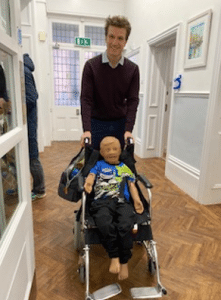What is Simulation Based Education (SBE)?
Simulation is an established educational tool in healthcare, and there are many benefits for primary care teams, with simulation-based education having shown numerous benefits for individuals, teams, and systems.
Simulation allows people and teams to experience and observe challenging situations in a safe environment, to share experiences, and to learn from both peers and facilitators to improve the care that we can deliver to our patients. There has been growing interest in Primary Care Simulation to:
- Improve staff confidence and capabilities
- Contribute to team working and other non-technical skills
- Build awareness of other team members skills and strengths
- Highlights latent errors in systems and processes
- Increase staff morale and satisfaction in roles

Training Hub Simulation Activity
Between December 2021 and April 2025 BNSSG Training Hub created a Simulation Faculty to develop resources, educators and courses for delivering high quality primary care simulation events.
Examples of simulation sessions that have been delivered include:
- Full day simulation sessions delivered in MDT focusing on primary care emergency and acute presentations put on in collaboration with the UHBW and NBT simulation teams
- Single scenario simulation sessions delivered to practice teams in their own clinical environments, including the ‘PCN Simulation offer’ in 2024/25
- Communication and consultation skills training for both clinical and non-clinical staff
- Safeguarding in primary care for ‘new to general practice nurses’ and GP STs in conjunction with Avon LMC’s ‘Legacy Nurses’
A wide range of topics have been covered, including:
- Team based management of an unwell / collapsed patient in a GP practice
- UUSC paediatric presentations (e.g. acute asthma, febrile child, non-accidental injury)
- Mental health presentations
- GP Emergencies hosted by NBT simulation services
- Consultation skills including generic skills and more specific skills such as shared decision making
- Adult and paediatric safeguarding scenarios (e.g injury in a non-mobile child, domestic violence)
- Managing challenging conversations with patients (for both clinical and non-clinical staff groups)
- Managing the angry patient
- Challenging conversations at the end of life
- Simulated ‘Duty Doctor’ session for GP trainees
Though there are many other topics that simulation lends itself to as an educational medium.
For further information please contact bnssg.training.hub@nhs.net.
Simulation Faculty Development
As well as delivering high quality educational sessions the simulation program has trained and developed a number of local simulation educators.
Over the program we have held ‘Train-the-Trainer’ days developing 14 local primary care staff to deliver simulation sessions.
These simulation educators have been provided further opportunities to practice and refine their simulation facilitation skills. These educators have been supported to deliver local simulation training for their PCNs and practices, which has ensured sustainability for the Simulation programme following its project completion in April 2025.
Together, we have delivered the majority of local primary care simulation activity in BNSSG in recent years.
For more information please register for the Virtual Hybrid Learning Faculty (VHLF) community at NHS Learning Hub.
Delivery of Simulation Training in Primary Care Video
Feedback and Participant Comments in BNSSG
When asked, 99% of course participants would recommend the course they attended to a colleague.
Learners feedback that they have enjoyed the hands on practical teaching, delivered face to face, using real kit, learning from and with colleagues, and based on relevant and realistic situations:
“Really excellent. Would love more of this”
“Brilliant session, great scenarios and great facilitators”
“One of the best teaching sessions I have been to this year. Really useful, practical, realistic scenarios from a GP point of view “
“Extremely relevant to primary care. Brilliant real-life scenarios. Extremely psychologically safe, which made learning enjoyable and fun!”
“Excellent facilitators. Can’t recommend the course enough. Perfectly pitched”
“The session was a great opportunity to practice important skills, learn from others and learn about vital equipment in the practice”
“Great to work all together as [a] practice”
“Great to do it in our own premises with our own kit, made it much more real”
“I really enjoyed the sim. It was incredibly informative & great to get to know the whole team better. Thank you!”
Resource Library
The simulation program has created a number of resources which we are keen to make readily available to anyone who is interested in continuing to deliver and develop primary care simulation in the BNSSG area. Resources include:
- Generic resources for holding a simulation training event
- Scenarios developed for primary care simulation training including “in-situ” sessions, standalone scenarios and scenarios used as part of one of our courses as outlined above
We also have further resources that might be useful to be kept with a practice emergency trolley, such as a ‘scribe sheet’, proforma to collect the information needed when calling 999, memory aids for SBAR handovers, NEWS scores and summary of ambulance response categories.
If you would like access to these resources or find out any more information about the opportunities for simulation in BNSSG general practice please contact bnssg.training.hub@nhs.net.

